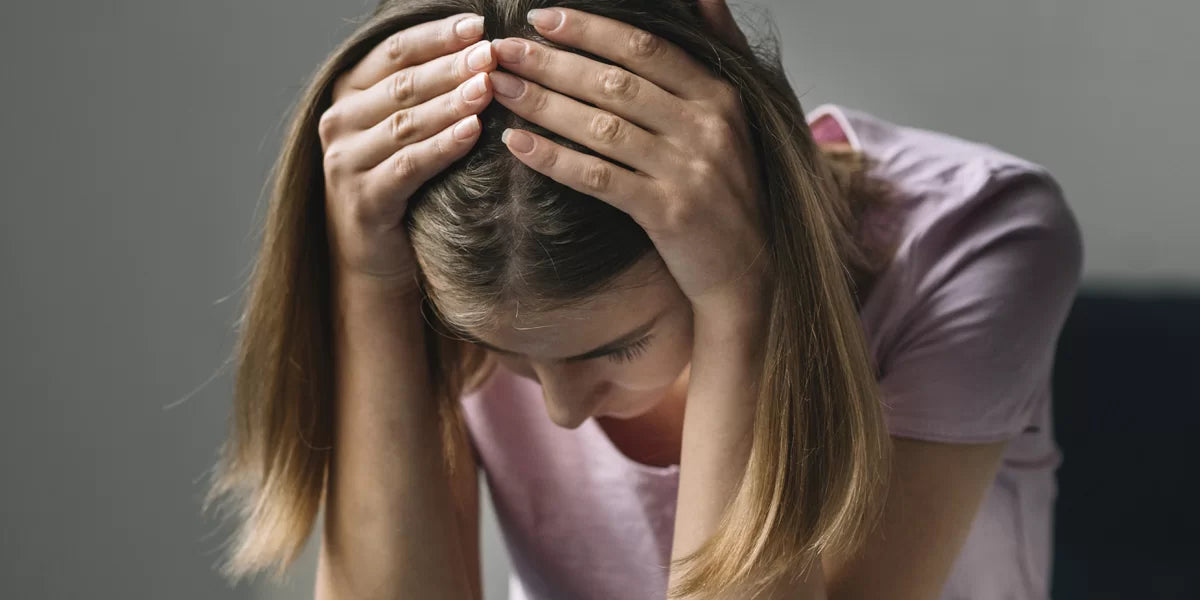A Q&A with our founder, Simone Thomas, of Simone Thomas Wellness answers your burning questions on causes of common hair loss and how to treat this.
Your hair is an integral part of your identity, seeing it shed can impact us both physically and emotionally. Have you ever picked up your hairbrush and been surprised by the amount of hair entwined in the bristles? Or checked out your shower plughole filled with lost hair and wondered why that is happening? Daily hair loss is normal, it’s only when it becomes a longer-term trend that you may be experiencing a condition called Telogen Effluvium, or stress-related hair loss.
On average, we lose around 100-150 hairs per day. The good news is that those are replaced on a regular basis. But what if you’re losing more than that and begin to see a pattern in your hair loss? Then it might be time to take a closer look at what is going on with your body and investigate the health of your hair.
Fortunately, not all hair loss is completely beyond our control and there are things we can do to encourage healthy hair regrowth. Knowing what type of hair loss, you are experiencing and how to treat this are the first steps in taking control over your hair.
Read on to discover the best telogen effluvium treatments available to encourage regrowth.

What is Telogen Effluvium?
Telogen effluvium is the most common form of diffuse (across the scalp), thinning and unexpected hair loss and the second most common form of all hair loss after alopecia. It is often triggered by stress or a sudden traumatic life event.
When you live with this level of significant stress, the body can react by shifting around 30% of hair to the resting or telogen phase of the hair cycle which can lead to shedding. In comparison, when your hair is at a healthy point, it will have about 80-90% of hair in the growth phrase and only 10-15% in the telogen phase, so it’s clear to see what an impact stress can have on your hair and body.
Telogen effluvium can result in the loss of around 300 hairs per day and it can take someone several months to notice this loss.
For many people, the busy nature of daily life with work, family and other responsibilities, can make it difficult to take the time to become aware of the growing impact of telogen effluvium on the hair.
The great news is that this situation is not permanent and usually only lasts around six months. There is plenty you can do to encourage telogen effluvium regrowth using targeted, natural treatments that are proven to get your hair and body back on track to peak wellness.

What Causes Telogen Effluvium?
This type of hair loss can be caused by a range of situations that may put a sudden and intense strain on your body. Having an abrupt shock, can cause the body and hair follicles to act in unexpected ways. Hair loss due to telogen effluvium can occur around 2-3 after the event which is why it can feel like an additional trauma.
The stress your body is going through has affected your hair follicles, preventing them from progressing the hair to growth phase and delivering more shedding than is normal. It may help to have a good think about how long your hair loss has been going on, when it started and how severe you think it is.
The common triggers of telogen effluvium include:
-
Serious illness, infections, high fever, severe viral infections
-
Major surgery
-
Severe life stress caused by events such as divorce, death of a loved one, violence or abuse
-
Hypothyroidism or hyperthyroidism
-
Abrupt hormonal changes, such as the menopause
-
Sudden or extreme weight loss due to dieting or illness
-
Nutritional deficiencies including Iron & B-Vitamins.
-
Intense physical trauma, examples could be a car accident, childbirth or miscarriage.
-
Skin disease affecting the scalp, such as erythroderma.
For more information on stress-related hair loss, and Simone’s personal recommendations to encourage hair regrowth.
Who is Affected by Telogen Effluvium?
Acute (sudden and short-lived) telogen effluvium can affect all ages of people from both sexes alike. Chronic (long-term) telogen effluvium with no clear triggering source appears more often in women between the ages of 30-60 rather than men, although this is not a hard and fast rule. Telogen effluvium won’t result in complete baldness, although if there is a genetic tendency for baldness, this type of hair loss may add to the symptoms.
There is no doubt that losing your hair, even if it is temporary, can really knock your confidence and be a distressing experience. Making sure that you get the correct diagnosis for which hair loss you are suffering with is vital in accessing useful solutions and getting the best telogen effluvium supplements to heal your body and boost hair regrowth.
How Do I Know If I’m Experiencing Telogen Effluvium or Normal Hair Loss?
If you are experiencing normal or minor hair loss, then you will recognise strands falling daily but will unlikely see a huge increase in the amount. Your head of hair should also look pretty much the same as it always has, despite a normal amount of hair loss each day.
However, if you have been experiencing frequent periods of hair shedding for more than 6 months, it may be telogen effluvium. There are other ways to diagnose the condition. Hair and nails are often affected in the same manner by stress. If you have seen a line across the middle of your nail, known as the beau line, this could have occurred at the point of stress, which could be a symptom of the condition.
There are other clinical assessments that can take place, such as:
-
An evaluation of whole scalp hair thinning, plus other body hair loss
-
Clinical examination reveals diffuse thinning without particular focal area hair loss, as would be present with alopecia
-
A hair pull test that involves more hair shedding than is normal
-
A trichogram (hair diagnostic assessment) can review whether 25% of hair is in the telogen stage. This would strongly suggest telogen effluvium is present.

How Long Can Hair Loss from Telogen Effluvium Last?
Most cases of telogen effluvium are temporary and last around 6 months. Some chronic cases, seen more in women than men, can last a little longer. The most important thing you can do is to try and eliminate stressful situations or emotions as much as possible as these will have caused the condition to occur in the first place.
Being proactive and getting helpful support is vital in recovery from this type of hair loss. Seeking an experienced and expert practitioner that can support your recovery is a helpful step to take so that you can access the best telogen effluvium treatments. Useful, practical advice partnered with natural telogen effluvium supplements will supply your hair and body with optimum levels of nutritional vitamins and minerals to help heal your condition.
Finding the Most Effective Telogen Effluvium Treatment
Fortunately, telogen effluvium is generally reversible. Regrowth will usually occur after triggers of the condition such as stress have been eliminated. Most people suffering from telogen effluvium will often experience hair regrowth within 3-6 months after the cause has been resolved.
There are no specific telogen effluvium treatments available as yet. If you are suffering due to medication that you have been put on by a doctor, speak to them about finding alternatives that are kinder to your hair and body.
The best way to encourage your body and hair to recover from stress, shock and telogen effluvium is through natural, effective telogen effluvium supplements. Supplements with ingredients such as Ginkgo Biloba B+ which contains powerful antioxidants and is incredibly beneficial at nourishing damaged scalp and stimulating hair follicles to encourage hair regrowth.
Find out more about the science behind Ginkgo Biloba, and how it can combat hair loss.
What Other Things Can I Do to Help with Hair Regrowth?
There are plenty of simple steps you can take to improve your overall health and the condition of your hair. It’s important we look after all aspects of our health in order to notice improvements in the condition of our hair. Here are a few simple things you can do to combat hair loss from Telogen Effluvium:
Reduce Stress
Stress is a key contributor to telogen effluvium. Experiencing intense stress or a sudden traumatic event will have consequences for your health and can cause the condition to appear a few months after the initial stress. It can be really beneficial to look at your life and see where there are stress points. Take the time to reduce stress in your daily life wherever you can, eliminating stress will give your body the best chance at recovering and not just aid health hair regrowth but optimal health. Read our latest blog to discover more about the link between our mental health and our hair.
Exercise
Exercise can really help in reducing feelings of stress and can take your mind off traumatic events for a while. It can lower blood pressure and release helpful endorphins that encourage the body and hair to work in a healthy way. Try to include some regular, gentle exercise into your daily routine. Just going for a walk, jog or stroll can lighten your mood, increase the body’s intake of vitamin D and help your body to function optimally.
Better Sleep
Lack of sleep can have such an impact on your body and your hair. We’ve all been there, you’re exhausted, your body can’t function properly, and you end up eating poorly to try to gain some quick energy, but overtime this really effects the condition of our hair. Getting good quality, regular sleep is vital in combatting telogen effluvium. Your body needs to rest and recover, so having a regular bed time, keeping your bedroom cool and calm while removing stress from your life will all support your body and hair health.
Gentle Treatment Of Hair
Try to gently and carefully handle, wash and brush your hair. Remind yourself not to be rough with your hair and scalp as this will only inflame the condition further. Make sure you let any hair practitioners that handle your hair know about your condition so they can be as gentle as possible, too.
Healthy And Nutritious Lifestyle
Eating a healthy, balanced diet is essential in boosting the vitamin and mineral deposits in your body and hair. A lack of protein or iron can often lead to hair loss or hair thinning, so including good sources of protein, such as quality meat and fish or eggs and protein-filled legumes like chickpeas and beans can really help.
Adding in extra sources of iron, like dark, leafy green vegetables, peas and dried fruits such as apricots will increase your body’s supply of iron to your hair follicles. As ferritin is stored in these follicles, this will encourage strong, healthy hair to grow.
For monthly recipes packed with nutritious, whole food ingredients and designed with health and wellbeing in mind, check out Simone’s recipes.

What are the First Signs of Telogen Effluvium Regrowth?
Losing your hair can feel so distressing. It takes a very resilient person not to allow hair loss to affect their self-esteem. If you have addressed the underlying reasons as to why telogen effluvium happened to you, and are making changes to combat the condition, then these are a few of the first signs that your efforts are paying off.
Reduction In Hair Loss
If you have resolved the main cause of your hair shedding, then in around 6 months you may start to notice that your hair is thicker and there are fewer hairs on your brush and in your plughole. Your hair will start to grow back and begin to hopefully reverse your diffuse thinning.
You Feel Healthy
All of the positive, proactive steps you have taken will start to make a difference. You feel rested, your energy levels are up, your skin is clearer and your hair is stronger and more resilient. Making diet and lifestyle adjustments will all contribute to an improved sense of wellbeing, and it will soon show in your hair.
You Feel More Relaxed
You are addressing the levels of stress in your life and this is making a huge difference. You are carefully thinking about how you respond to stressful events you can’t control and trying to reduce any avoidable anxieties that could trigger tension within your life. Responding in this way will support your hair in its regrowth phase.
Your Hair Is Growing
You may not notice this at first, and don’t worry if you’re doing everything right but not seeing hair regrowth yet. It can take time and telogen effluvium may affect certain parts of your scalp more than others. It might be a good idea to check around 3-6 months after shedding began to see if your hair is growing on the top of your hairline.
If you can’t see it using a mirror, ask someone you trust and feel secure with to take a look at your crown so that you can be sure those hair follicles are producing new hair.
Expertly Formulated Ginkgo for Hair Regrowth
Simone Thomas Wellness has created a range of natural, effective products expertly formulated with the finest ingredients to target hair loss conditions like Telogen Effluvium.
Ginkgo Biloba+ is ideal for those suffering from hair loss as a result of stress, with anti-inflammatory properties and gentle yet powerful ingredients, it provides the follicles with the essential vitamins and minerals it needs to soothe your scalp and strengthen your hair follicles to stimulate and encourage healthy regrowth. Ginkgo Biloba+ is also included within our 3 Step Ginkgo Hair Care Plan for added health benefits.
Discover more about the ingredient Ginkgo Biloba and how it's powerful antioxidants can encourage hair regrowth to reveal strong, healthy, and shiny hair and improve your confidence. Save 16% when you subscribe to monthly recurring orders, delivered straight to your door!




























